How to Start Existing on the Internet
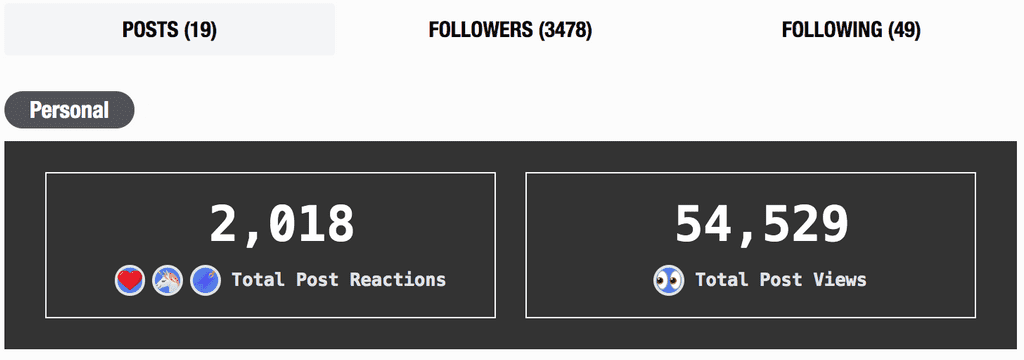
Warning, this is a detailed post. If you want to just see the results click here
Intro
For those of you who don't know me. Hello, my name is Ryland. I'm an engineer/product manager working for Binaris (a startup) in the Bay area.
About a month and a half ago, my company was going through some significant changes. [We launched an effort to get feedback about a new idea I was pushing through the company](product for a new audience). As part of this effort, I had to create some content (blog, video) and then subsequently evangelize that content across social media.
Not wanting to lose momentum that the work event had given me, I decided it was the right time to start working on my social presence.
Getting Acquainted
Most people who know me also know that I'm not a fan of social media. I really believe that current platforms are designed to manipulate and hook users, instead of encouraging genuine social interactions. Although I feel very strongly about this, I also strive to be a pragmatic person. And since social media is such a key aspect of modern day business, I knew that I had to get with the program.
Until about a month ago I was completely off social media. I had a Facebook account in high school, but it's been mostly deactivated for the last 6 years. I do use Reddit constantly, but mostly as an informational tool, not for social interaction. I originally created my twitter account two years ago, but until ~1.5 months ago, I had only 40 followers (entirely made up of personal friends) and I hadn't tweeted (anything at all) since making the account originally. Here is my non-activity from April of this year.
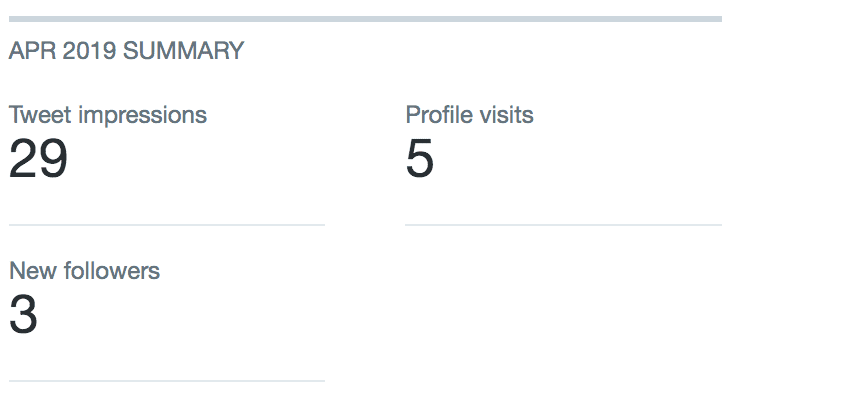
After doing some research, I decided that twitter was the best bet for establishing myself. Even though I didn't understand the culture or the platform, I believed Twitter had the strongest demographics relevant to me (tech and lifestyle). I started by following a number of top influencers and quickly started to learn what type of content works well on Twitter.
From May 15 to May 30, I gained ~600 followers purely through tweeting arbitrary thoughts, posting joke tweets and replying to interesting content on my feed. Having done my research, I knew that hashtags were critical for tweet visibility, so I used them generously. During this time my average tweet was doing pretty decently, but the content wasn't represenative of "me".
The title "programmer" is pretty intimidating, it means you skip "novicegrammer" and "semi-programmer" and go straight to the big leagues.#programming #programmer #javascript #coding #reactjs #development #frontend
— Ryland (@taillogs) May 20, 2019
My most successful tweet of May
Towards the end of May I started to realize that although people were following me, I wasn't establishing any credibility. If you're relatively unknown on Twitter, establishing credibility is incredibly difficult. I strongly believe that this aspect of twitter contributes to the incredible toxicity of the platform and really hurts meaningful discourse. Trying to stay pragmatic, I looked for other avenues I might use to expedite my growth.
MyOS
Based on my observations from Twitter, I hypothesized that creating an open-source project was a pretty reliable way to get traction. Many social media tech influencers were creators of popular open-source projects, giving them both technical credibility and an already involved audience that was likely to follow them outside of Github.
I had been working on a personal project for a few months, and it was something that I was eager to share with others. I realized that it would be very difficult to spread the word through Twitter alone, and that a blog post seemed like a more appropriate medium. I'm very comfortable with webdev, so I spent a day or two building a blog using Gridsome.
I then moved onto cleaning up my code and writing the accompanying blog post. I really believed in the value of the project (it's something I had already been using every day), so I decided that I would do everything I could to make it visible. When everything was ready, I published the project to Github and started posting the corresponding blog post everywhere I could.

Someone gave me platinum on /r/vim

MyOS Reddit posts
During my quest to post MyOS across the internet, I heard about a newer, community-driven content platform, Dev.to. I liked what I saw after an initial visit, and decided to cross post my blog there too.

I also considered cross posting to Medium as well, but it was then that I discovered the lack of canonical_url support on Medium.
I've created an open source project using @Docker for sharing and developing terminal environments #docker #vim #unix #linux #programming #terminal #containers #javascript #development https://t.co/9b3oG044cJ
— Ryland (@taillogs) May 30, 2019
MyOS was more of a success than I initially expected. As of today the project has ~120 stars and 16 contributors, not bad for a first try. Unfortunately, the MyOS model doesn't scale. It took me months to get the project into a place I was willing to share, there was no way that a multi-month process was an efficient (not to mention the risk) method of gaining followers.
But something else came out of the MyOS effort, I now had a personal blog.
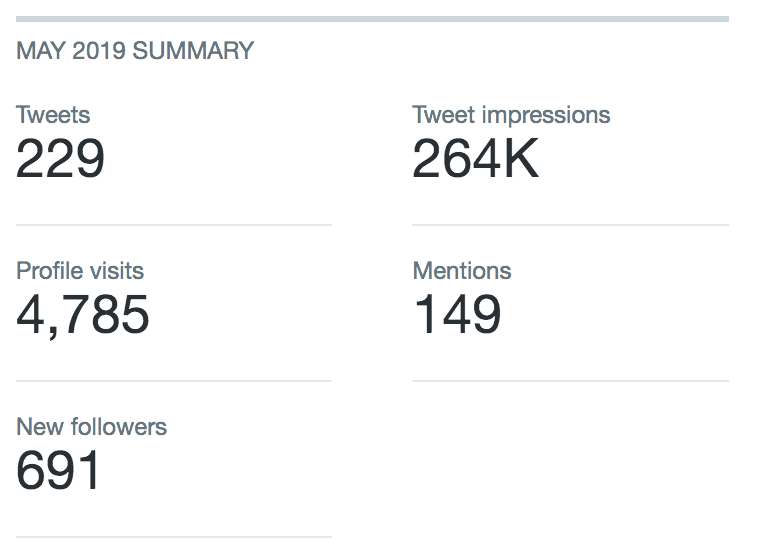
Twitter stats for May (includes MyOS traffic)
The Best Medium
A week before the MyOS release, I started seeing a lot of negative attention directed at Medium on Twitter. After doing some research, I realized that most of the anger was misguided so I did my best to combat the disinformation.
Recent hate towards @Medium is unwarranted
— Ryland (@taillogs) May 20, 2019
- Articles can now be published behind a paywall (opt-in)
- By default, published content is not paywalled
- Flat $/month unlocks all paywall content
- 3 free paywall articles a month
The author is the one making you pay, not @medium
But then, in early June, a leaked email from the Free Code Camp founder Quincy popped up in my feed. It was obvious that Quincy was unhappy with the leak, and because the tweet was relatively unseen, I figured it would dissipate.
A few days later, articles started appearing referencing the leaked email and I no longer felt morally/ethically inclined to keep quiet about it. I was already frustrated from my experience with Medium, and I felt that the actions alleged in the email crossed the line. I quickly wrote a post discussing the leaked email, along with my personal issues with Medium. I knew the post was controversial, which is almost always a good thing if you can handle it. I once again posted across many "mediums" (I'm funny), this time immediately posting to Dev.to.

I also decided to post to hacker news, which I had never done before. Many will probably argue with me, but I think Hacker News is one of the most negative platforms in existence. And because my story was negative in message, the post took off and was #1 on Hacker News for most of the day.

I accidentally posted to /r/javascript thinking it was /r/technology and was shocked to come back and see that it also did quite well.

At this point, I was primarily linking to my personal domain instead of Dev.to, here's the google analytics.

Dev.to
The Medium post did pretty well, but more importantly, it showed me the potential of Dev.to. From just the MyOS and Medium post I had nearly 500 followers on Dev.to. I'll be honest, my first guess was that Dev.to was inflating my follower count for some sort of social psychology.
I started looking into it and realized very quickly that nothing malicious was going on, in fact it was the opposite. Because Dev.to does not publicly display follower counts, readers tend to follow based on content they like, not who they think is popular. This resonated with me deeply, as it perfectly solves the issue I have with platforms like Twitter. On Dev.to what is being said matters much more than who is saying it.
At this point I was still very uncomfortable writing blogs and getting "out there". It may seem hard to believe, but I'm not a very extroverted person. Having overcome personal deficits like these in the past, I knew total immersion was a quick and reliable way to normalize yourself to an uncomfortable experience. In light of this, I decided I would do my best to post something every weekday for the next month. This was a serious undertaking considering I work fuller time at a startup already.
Blog Blog Blog Blog
Week One
The first week was easy, there was only one day left after the Medium post. I hadn't fully committed to the plan, so the post was essentially a discussion thread.
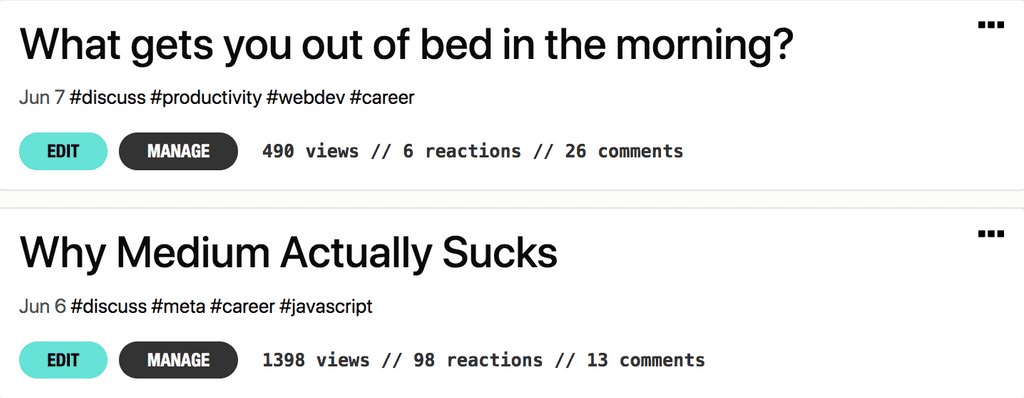
Week Two
Things ramped up during the second week. I was posting everything to my personal blog, but I was only giving out links to the Dev.to versions. This was a hard choice but it mostly stemmed from users existing familiarity with the Dev.to platform as opposed to my personal site. I predicted that people would be more willing to engage/interact if they already had an account.
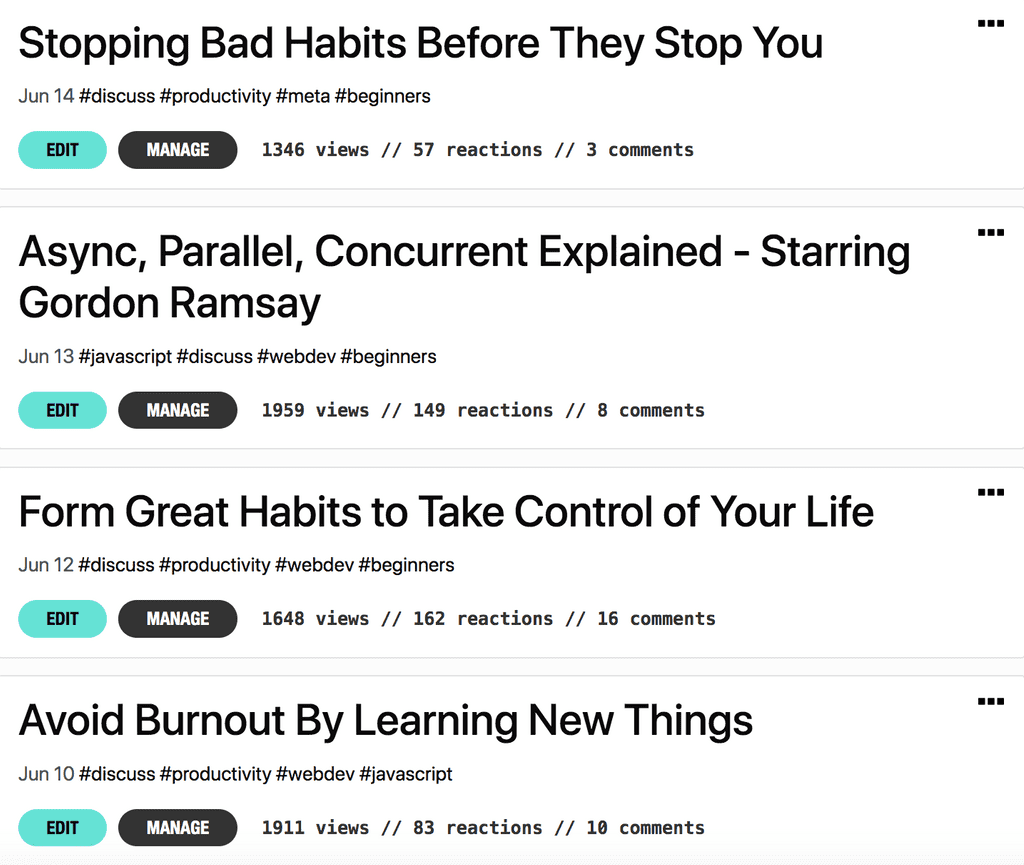
I started experimenting with different types of content during this week. It was obvious that I had the technical chops to produce highly technical content, but it was much easier to produce high quality non-technical content with my limited time. You have to understand these are each full-fledged blog posts, they take a lot of time to write. I also started to get familiar with my content pipeline, each day I would post my new content to the relevant platforms.
Stopping Bad Habits Before They Stop You#DEVcommunity #productivity #fitness #health #lifestyle #habit #coding #tech #javascript #learn #fridaythoughts #fridaymotivation #friday #selfimprovementhttps://t.co/hlEfEDL6Ov
— Ryland (@taillogs) June 14, 2019
As you can see from the above tweet, my content start getting more engagement. This was a combination of a growing twitter following (was up to nearly 800 followers) and the added Dev.to traffic that I previously wasn't receiving.
Week Three
I was getting into a real rhythm by this point. As they say, the best way to get good at something is by doing it. Writing became less of a painful experience which translated into more time and better content.
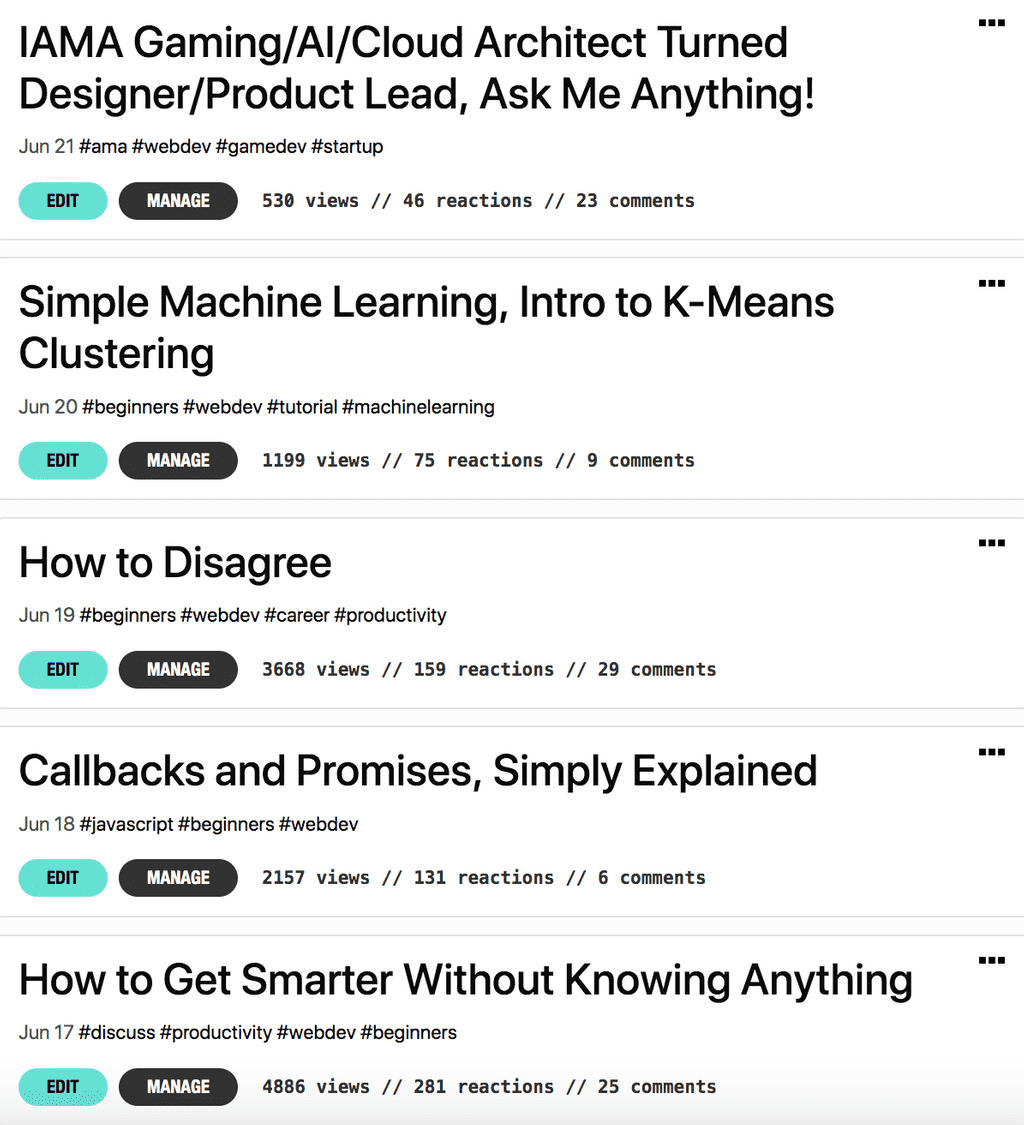
The biggest win was the first post of the week which actually ended up being one of my best posts yet. I definitely attribute some of its success to my corresponding Reddit posts.

Note: If you try and self-promote on Reddit, you're going to have a bad time. I don't post everything to Reddit, and when I do I make sure it's in a digestible Reddit friendly format. I also made a rule that for every piece of content I posted to Reddit, I needed to comment on 5 other peoples posts and help/respond to them.
The post about disagreement also did quite well, I assume mostly due to this fortunate tweet by Dev.to on Twitter.
Have Empathy, Don't Have an Ego
— DEV Community 👩💻👨💻 (@ThePracticalDev) June 19, 2019
If there's one item you follow on this list, it should be this one.
{ author: @taillogs } #DEVCommunityhttps://t.co/O5f9S2C13w
The biggest surprise of that week was actually my post about K-Means. I really felt that it was higher quality writing/content than anything else so far, which led me to realize that there is essentially not a data-science community on Dev.to.
For those wondering why I did an AMA instead of a proper post on Jun 21, it's because it was a Friday. After looking over general statstics of content posted to Dev.to, I realized that Friday was practically a dead day, and therefore I could be more lax with what I posted. I also felt that the AMA was a nice way to establish credibility.
Week Four (The Final Week)
Week four started very strong. My first post of the week was about Elon Musk, Elon Musk isn't related to either of the topics that had been working for me so far. Regardless, I knew that it was niche content and had a lot of appeal because of how popular Tesla was.
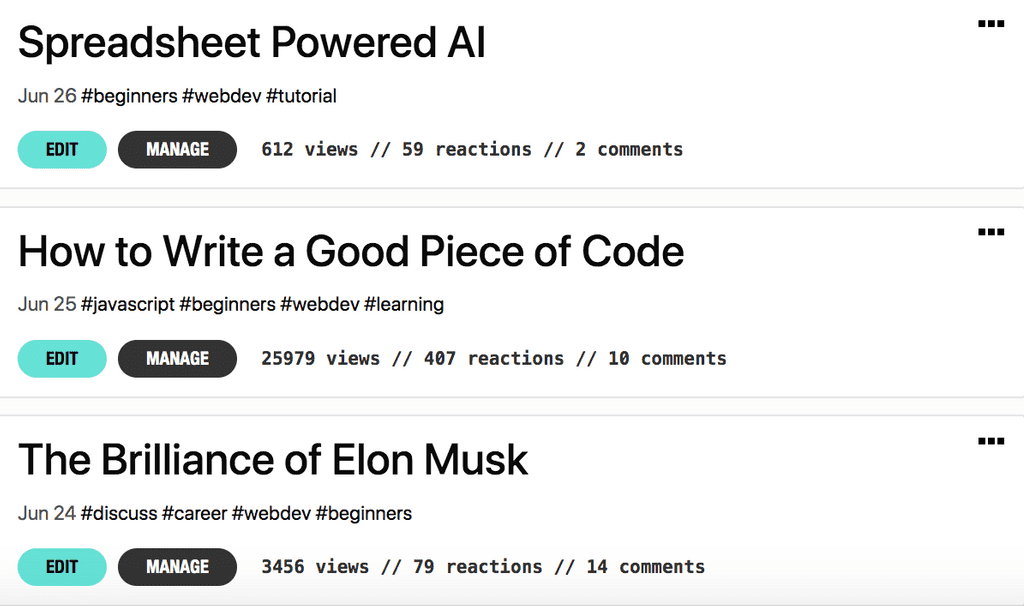
A lot of writing successful content comes from understanding the topology of society and the internet. For example, because I knew Elon Musk has a semi-cult level following, content that positively depicted him might do quite well. Especially when posted to communities dedicated to that type of content.

I also learned that when someone is controversial like Musk, writing content about them will also bring that controversy back home.
He’s stupid actually
— Robberson (@DamnRobber) June 24, 2019
A Response to My Elon Musk Blog Post Tweet
I really was short on time for Tuesdays post. I actually ended up scrapping my entire post about 1 hour before I went to sleep and then writing something entirely new in a panicked rush. That post, "How to Write a Good Piece of Code" ended up being my most successful post by a HUGE margin. I attribute this almost entirely to the fact that it sat on the frontpage of /r/programming for over an entire day.

How to Write a Good Piece of Codehttps://t.co/kknxGXFkl6#DevCommunity @thepracticaldev #javascript #coding #programming #python #java #rust #reactjs #vuejs
— Ryland (@taillogs) June 25, 2019
The Tweet Also Did Very Well
Wednesdays post was special, or so I thought. It was a project I had been working on for a very long time, and walked through the process of building a simple AI (Multilayer Perceptron) only using Google sheets formulas. I use Google sheets all the time, and I figured it was something that nearly everyone can relate to. I was wrong. The post didn't do terrible, but not good enough to justify the number of hours I invested. This also confirmed my previous suspicion that there isn't a data science community on Dev.to.
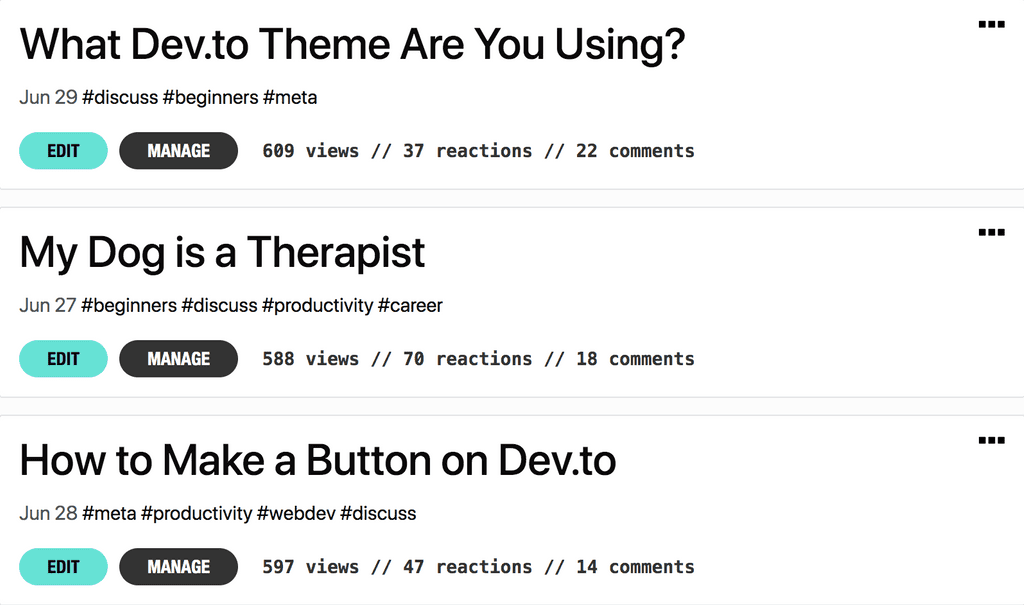
Even by Thursday, "How to Write a Good Piece of Code" was still dominating my social media. Every morning I would wake up to tons of notifications from people sharing it. Partially due to this (and just being so exhausted), for the last 3 posts of the month (Thursday, Friday and Saturday) I kept things very casual.
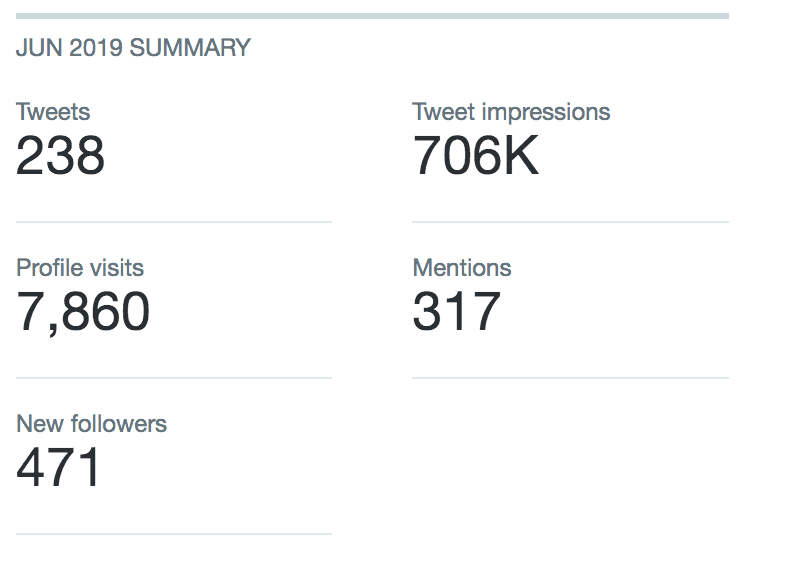
June Twitter Stats
Outcome
The story I told is great, but what about the results? We'll start with Twitter, as the initial goal was to get more Twitter followers.

Over the course of 1.5 months I essentially went from 0 twitter followers to ~1250 Twitter followers. I have no real way to gauge this but I'm personally pretty satisfied. I also think, because I shifted my focus more towards blogging, it slowed my twitter growth.
The biggest gains were actually on Dev.to. In exactly 30 days of having a Dev.to account, I gained 3500 followers and accumulated ~54k views from scratch.
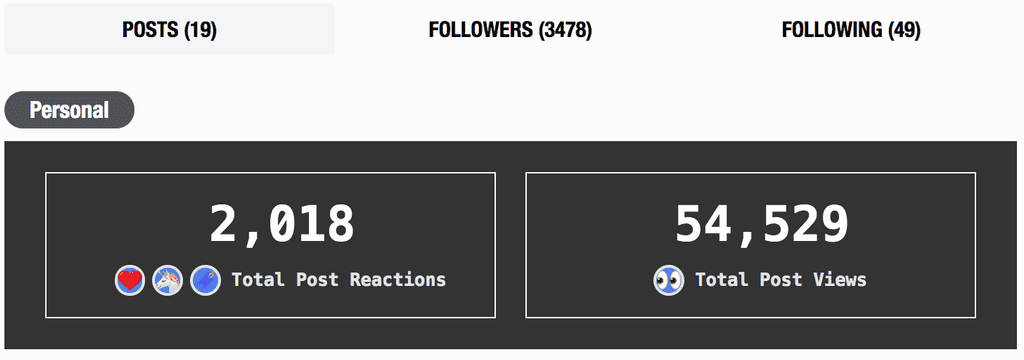
For any of you still wondering if Dev.to is a good place to get started, wonder no more. Lastly, this is the karma I gained on Reddit from posting my content and helping random redditors with tech questions.

Disclosure: I had never purchased "ads on the internet" before and was curious, so I spent ~$200 across Reddit, Twitter and Google trying out the respective ad platforms. But either because ads suck or because I suck at ads, they did very poorly and resulted in almost no increased traffic.
Takeaways
- Some content isn't going to do well This is something that I 100% expected going into the process, which made it really easy to stay productive throughout. The biggest benefit of making yourself do this every day, is that you'll eventually post so much content that a few poorly received pieces aren't as meaningful. Often, those who don't are "afraid" to blog have a lot of anxiety that what they make will not be well received. Posting frequently allows you to solve this problem with scale. Yes some content won't work, no it's not because it sucks (maybe wrong audience, maybe wrong format).
- It's not as scary as you think I won't lie and say that the blogging/social media process is something I enjoy. But I definitely don't feel the same stomach knotting I did when I started a month ago. I know a lot of people out there struggle like I did, but I promise its all in your head. As long as you go out there with a self-improvement mentality, and are willing to fix your mistakes, it will be a smooth ride.
- Write Outlines: I recommend that you never start writing a blog post without at least a rough outline. Not only do outlines make it easier to write content, it also usually makes the final product a lot more concise and focused. I wasn't using outlines at the beginning of the month and things were rough.
- You have to evangelize your content: I see so many great posts that never gain traction because the author doesn't share it adequately. I know a lot of people are uncomfortable with this (including me at the beginning of last month), but you really shouldn't be. If you spent the effort to make a quality product it's illogical to not at least put some effort into sharing it. You can see how much extra traction my posts got from me making sure it was visible in multiple platforms.
- Dev.to is hot: If you're not already considering writing content on the site, you should be. The amount of growth I've seen in the month I've been here is astounding. I've also had many interactions with the Dev.to team and can safely say that they are some of the most reasonable, positive, level headed people you'll meet. I probably get on their nerves constantly and they've never complained. The community is also pretty non-toxic, but I fear that's simply a factor of its size.
- Engage back: If you just write posts and don't respond to comments/reactions, you're missing out. I did my best to give a genuine response to every reasonable/non-troll comment I received. Yes, it's time consuming, but it also is highly visible and helps build a positive image of you in the community.
-
I can't post every day The month of June was ROUGH for me. I didn't have a single moment of free time. I was either working at my startup or writing content for the next days post. I would say that I was averaging 12-16 hours of just working, writing and editing, every day (including weekends). And that's almost entirely productive time. I eat only 1 meal a day, and I live 5 minutes from work, so very little overhead.
Wake up -> Work -> Go Home -> Work -> Go to Bed -> Repeat
